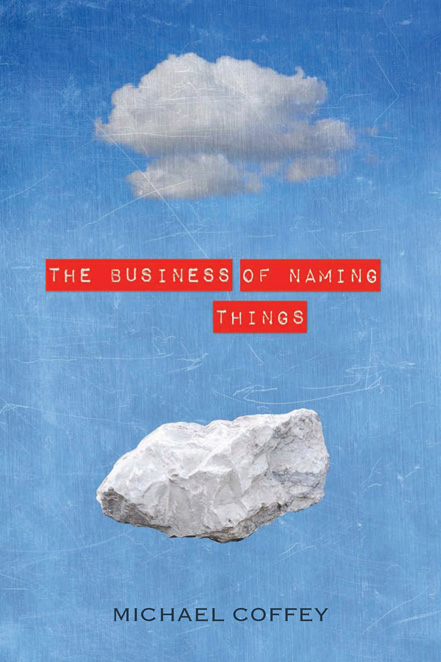
The Business of Naming Things
فرمت کتاب
ebook
تاریخ انتشار
2014
نویسنده
Олег Юрьевич Захаровنویسنده
Олег Юрьевич Захаровنویسنده
Michael Coffeyناشر
Head of Zeusناشر
Head of Zeusشابک
9781934137871
کتاب های مرتبط
- اطلاعات
- نقد و بررسی
- دیدگاه کاربران
نقد و بررسی

Starred review from July 28, 2014
The riveting prose in Coffey’s first collection of stories leaves the reader feeling unsettled and unmoored. In “Sunlight,” a man named Michael who works for Publishers Weekly (where Coffey was co-editorial director before retiring earlier this year) visits Harold Brodkey as he’s dying of AIDS. Michael believes that being an adoptee is the “source of all his problems” and asks Brodkey, who’s also an adoptee, whether being adopted prevented him from writing a “conventional narrative.” This sense of unrest and disquiet adds depth to the eight stories, which are varied but share certain themes, returning repeatedly to relationships between fathers and son and husbands and wives. There is no conventional narrative here. Coffey brilliantly examines the efforts of a mother to cope with her son’s death in “Moon Over Quabbin”; he uses the J.F.K. assassination as a backdrop to a tale about a sinful priest in “Inn of the Nations”; and, in “Sons,” he explores a difficult father-son relationship in the context of a possible Obama assassination attempt. This collection, which features first-, second-, and third-person narration, is vibrant and unsparing.

November 1, 2014
A clutch of well-crafted stories, thick with literary references, that turn on busted relationships between men and women and fathers and sons.Harold Brodkey, James Joyce, J.F. Powers, Henrik Ibsen-each of these writers finds his way into the eight stories in this first work of fiction by Coffey (Days of Infamy, 1999, etc.). The name-checked authors hint at some of Coffey's chief concerns-masculinity and faith most prominently-as well as his approach to style. "Inn of the Nations" centers on a priest who's lost his passion for his calling and pursues an affair with a nun; set shortly after the JFK assassination, the brief story describes how "he'd become hardened to his own sin" but is without religious sanctimony. The broader "Sons" pursues a similar theme, following an alcoholic poet as he worries that his son is complicit in a calamity that makes national news; in Coffey's hands, the man's drunken fog reveals his self-loathing even while he busily labors to obscure it. This collection's stories are carefully chiseled, and the prose is sometimes stiff, but Coffey will occasionally cut loose, as in the closing "Finishing Ulysses," which follows a professor eager to teach Joyce's classic who's out on the town in Philadelphia. Though short, the story has an appealingly jazzy, impressionistic, stream-of-consciousness rhythm. ("Smokes you need and why not the bennies. Some jump. Setting sun crashing into the facade of the church over there.") Most of these stories capture men in decline, but one of the collection's best is more tender: In "The Newman Boys," the narrator recalls his brief childhood acquaintance with a neighbor boy diagnosed with hydrocephaly; the story captures the narrator's narcissism, fears, confusions about adulthood-and, in its closing pages, a sense of how small kindnesses can resonate across decades. Sober and smart writing that evokes the more mannered American stylists of the 1960s and '70s.
COPYRIGHT(2014) Kirkus Reviews, ALL RIGHTS RESERVED.

Starred review from November 15, 2014
The eight stories in this superb collection are set in widely diverse times and places across the United States. The theme of seeking links each tale. Coffey's principal characters search for something just out of reach--understanding, mostly, but also forgiveness and fulfillment. The strongest stories place characters against historical backdrops. The brilliant "Finishing Ulysses," for example, takes place on the night jazz legend Clifford Brown dies in an automobile accident, while the disquieting "Inn of the Nations" eerily conveys a priest's spiritual breakdown after the assassination of John F. Kennedy. Allusions to Joyce's masterpiece run throughout these pieces, which depict fathers who have lost sons, sons who seek fathers, and women and men who anticipate the arrival of a great love. VERDICT In his first book of short fiction, poet Coffey, former coeditorial director of Publishers Weekly, delivers startlingly original and at times darkly funny stories that interrogate the very act of reading as well as human ambitions and the self-deception sometimes needed to realize them. His characters are as flawed and complicated as they are recognizable and sympathetic; all fiction readers can enjoy.--John G. Matthews, Washington State Univ. Libs., Pullman
Copyright 2014 Library Journal, LLC Used with permission.

December 1, 2014
Coffey's engaging short story debut features characters connected by their pursuit of personal identity, whether they are poised at a crossroads or mining damages of the past. The haunting Moon over Quabbin focuses on a mother struggling to make sense of the death of her son. Inn of the Nations follows the breakdown of a small-town Catholic priest with a terrified nun in tow. While many of the characters are knowledgeable about their world, they nonetheless struggle to find their place within it. In the titular tale, a man who specializes in trademarks is compelled to visit the community that has voted to change the name he previously bestowed, where he finds himself unexpectedly reunited with his son, the aptly named Pall. A thorny dynamic between father and son is again explored in Sons, when Liam begins to suspect that his wayward son, with whom Liam has a distant relationship, may have been involved in an assassination attempt on the president. Coffey's eight tales meticulously explore characters' frailties and insecurities amid their search for self and belonging.(Reprinted with permission of Booklist, copyright 2014, American Library Association.)

























دیدگاه کاربران